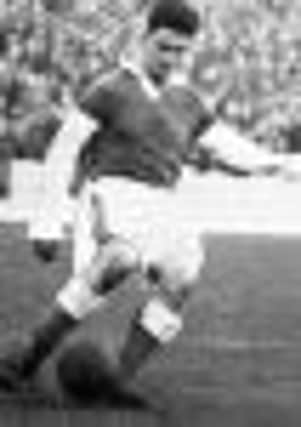Hearts and Hibs legends’ memorabilia to go on sale


Among the items on show will be international Scotland shirts belonging to Hibs and Hearts legend Gordon Smith, as well as a Ping Cushin putter illuminating the player’s other passion – golf.
Auctioneer David Convery hailed the new collection. He said: “Having objects like that which are still in good condition and for them to belong to a Scotland international like Smith doesn’t happen very often.”
Advertisement
Hide AdAdvertisement
Hide AdMr Convery said the auction would offer plenty to interest fans of both clubs and revealed he had also obtained a 1977 Scotland shirt given to former Hearts striker John Robertson by ex-club manager Joe Jordan.


But he said the Gordon Smith collection was particularly exciting and offered a fascinating snapshot of the private interests of the player. A member of the “Famous Five” front line that led Hibs to three league championship titles between 1948 and 1952, he also won league titles while playing for Hearts and Dundee.
He said: “The objects belonging to Smith – the shirts, a putter and a toilet set given to him by the Irish League in the late forties – are really from the golden age of Scottish football.
“At that time all of the big clubs had very good players vying for a position in the Scotland team and Smith was part of the Hibs Famous Five – one of the best front lines in the club’s history.
“The Ping putter is from the 1960s. It was owned and used extensively by Gordon. He really loved his golf and, living in North Berwick, had some of the country’s best golf courses at his fingertips.


“It was a stand-out item when I spoke to Gordon’s family. It’s in great condition and one that you could still use even today.”
Mr Convery, an auctioneer for 25 years, said he was particularly proud of a rare East of Scotland Football Association cap, dating from 1889 and believed to have been awarded to an unknown Hearts player for participating in the Inter-Association games. He said a huge collection of match programmes would also provide a unique insight into the evolution of the two clubs.
With messages from successive managers, pool results and adverts for local businesses, the match programmes – some dating from the 1940s – functioned as important sources of information for fans.
Advertisement
Hide AdAdvertisement
Hide Ad“Back in the 1950s and 60s, football was very much a working-class sport and that’s where people in the city would have got their information – general football facts, scores, player profiles and so on,” he said.
“There are some very rare lots in this collection, which I think illustrate the development of the sport’s social history.”
The collection has also been hailed by experts on the history of Hearts and Hibs.
Official Hibs historian Tom Wright said: “These pieces come from such an important period in Hibs’ history and we’d hope to acquire quite a few of them for the club’s own collection. We’re always keen to collect new memorabilia, particularly for someone iconic like Gordon Smith.”
Hearts historian David Speed said: “The East of Scotland FA cap would be a tremendous item to have – I don’t think I have ever seen one – and the programmes from the forties and fifties are also very rare. I would encourage any Hearts fan with an interest to go along and have a look.”
Making the most of your collection
AT a time when the value of stocks and shares is so uncertain, sports memorabilia could be an excellent long-term investment. But there are pitfalls to avoid . . .
1: Aim to build a collection rather than a series of individual objects and start with one or two quality pieces. Future purchases should be based on these.
2: Look for objects that are not common in the market. If you know a footballer refuses to give autographs, search until you find something signed by him.
Advertisement
Hide AdAdvertisement
Hide Ad3: Fakes have always been an issue for sports memorabilia collectors and the growth of internet sales has made this a serious problem. To avoid being scammed, buy from a reputable dealer and ensure your purchase comes with a certificate of authenticity.
4: If you’re collecting as an investor, you’ll eventually want to sell. The value of your collection will depend on its condition so the items must be kept pristine, usually by storing them in a protective case.
5: Prices and values in sports collecting change often. Make sure you keep on top of new trends in the market.